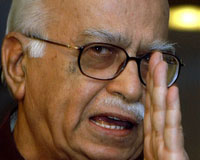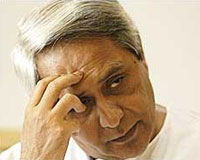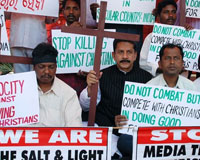Violence cripples Hindu nationalist election hopes
by - 17th March 2009
 The national elections and assembly elections in the eastern state of Orissa, where an unprecedented spate of anti-Christian attacks occurred last year, are only a few weeks away.
The national elections and assembly elections in the eastern state of Orissa, where an unprecedented spate of anti-Christian attacks occurred last year, are only a few weeks away.
And the prospects of India’s Hindu nationalist Bharatiya Janata Party (BJP) appear to be gloomy.
With elections scheduled over four weeks from April 16 to May 13, the Biju Janata Dal (BJD), a regional party in Orissa that was in coalition with the BJP for 11 years, has announced its breakup from the right-wing party.
The split also means that the BJD has ceased to be an ally in the National Democratic Alliance (NDA), India’s main opposition front led by the BJP, for the general elections.
It is believed that the BJD had begun to see the BJP as a liability since the latter’s open support for anti-Christian mayhem in Orissa’s Kandhamal district in August last year.
The violence that followed the murder of a senior Vishwa Hindu Parishad (World Hindu Council or VHP) leader Swami Laxmanananda Saraswati on August 23, 2008 resulted in the killing of at least 127 people and destruction of 315 villages, 4,640 houses, 252 churches and 13 educational institutions, besides rendering more than 50,000 homeless.
While a Maoist group claimed responsibility for Saraswati’s assassination, sections of the BJP state leaders and the VHP maliciously blamed Christians for it, inciting the violence.
Paying the price
On March 11, The Times of India daily quoted the strategist of Orissa’s regional party BJD, Pyari Mohan Mohapatra, as saying that ‘the BJP was attempting (to implement) a Hindutva (Hindu nationalist) agenda in Kandhamal which the party did not approve of’.
Mohapatra, a Member of Parliament and former bureaucrat, however, maintained only that ‘it is one of the factors’ behind the break-up.
 The Hindu, another national daily, also reported that Chandan Mitra, BJP’s chief negotiator with Orissa Chief Minister Naveen Patnaik, had admitted that Patnaik had been ‘very disturbed’ by the developments in Kandhamal.
The Hindu, another national daily, also reported that Chandan Mitra, BJP’s chief negotiator with Orissa Chief Minister Naveen Patnaik, had admitted that Patnaik had been ‘very disturbed’ by the developments in Kandhamal.
Mitra, however, later tried to underplay Kandhamal as a factor behind the BJD’s move.
‘Mitra gave me an account of the meeting (between him and Orissa Chief Minister and BJD chief Naveen Patnaik to discuss seat-sharing for both state and national elections) where, he said, Kandhamal was not mentioned even once. I spoke to BJD seniors as well, and they said the same thing,’ Tehelka weekly’s senior editor Vijay Simha told Lapido.
‘If so, it is a shame that two important political parties in India can conveniently overlook a serious anti-Christian campaign in a secular nation,’ added Simha, who covered Orissa violence for Tehelka from Kandhamal.
After breaking ties with the BJP on March 7, Orissa’s regional party indicated that it would join the newly formed ‘Third Front’, a coalition of regional parties led by communist parties.
This would offer an alternative to the BJP-led NDA and the ruling United Progressive Alliance (UPA), which is led by the Left-of-Centre Indian National Congress (‘Congress’) Party.
Angered with the BJD, the BJP promptly withdrew support for the ruling state government following which the former was asked to prove its majority to continue its rule in Orissa.
To the BJP’s surprise, the BJD managed to prove a majority in the 147-member assembly on March 11.
State elections
Free from its ‘secular’ partner, the BJP on March 17 declared that it would use the killing of Laxmanananda Saraswati as its main poll issue in the state elections, which will be fought mainly between the BJD, the BJP and the Congress Party.
 Launching her party’s election campaign, BJP leader Sushma Swaraj blamed Patnaik for the murder of the VHP leader, IANS private new agency reported.
Launching her party’s election campaign, BJP leader Sushma Swaraj blamed Patnaik for the murder of the VHP leader, IANS private new agency reported.
‘Those who should have been behind bars are moving scot-free and our workers are in jail (for attacking Christians in ‘retributive’ violence),’ she was quoted as saying.
Dr. John Dayal, secretary general of the All India Christian Council and a journalist, believes however that the use of Hindu nationalism in the elections will cut no ice.
‘The loss of the partner is a sore blow for the BJP. The BJD has not allowed the BJP to expand into fresh areas, and now the BJP will find it impossible to get a single new seat,’ Dayal told Lapido.
The BJP won only 32 of the 147 assembly seats in the 2004 state elections.
The opposition Congress party in Orissa, added Dayal, is likely to gain only in constituencies where the BJP cuts into the BJD vote, ‘and there are not too many of them’.
As regards the Left, it has a few pockets of influence, and its support for the Patnaik campaign will be a ‘morale booster’.
Calling the BJD’s move ‘a late disassociation with the BJP’, Dayal went on to say that there were three key issues in the elections in Orissa.
‘Who shares the responsibility for the communal and economic situation in the state? Orissa is one of the most backward states in the country.
‘Can the BJD rid itself of the communalism tag by such late disassociation with the BJP? And can the Congress Party claim credit for challenging either the anti-people anti-Christian violence in the state?’
Orissa, said Dayal, had suffered severely not just from the anti-Christian violence in 14 of the 30 districts in the state, but also from large-scale violence against farmers and labour activists in the Posco.
Posco is a steel plant project in Jagatsinghpur district by Posco-India, a subsidiary of South Korea’s Pohang Iron and Steel Co which has annexed agricultural land from farmers, and caused the deaths of large numbers in police firings.
‘In both these cases – of communalism and anti-people positions, all three parties share the blame. The BJP and the BJD as political partners and the Congress Party as the originator of the globalisation economic policies.
‘Only the Left opposed the impact of globalisation, the alienation of land to the mining sector and so on’, he said.
The prognosis at this early stage is that the BJD is likely to return to power, Congress will be runners-up with the BJP in third position, possibly neck and neck with Congress and losing by whisker, said Dayal.
‘For the Christian victims, succour lies in court directions being implemented by the government which comes to power.
But if Patnaik is returned as Chief Minister without the BJP, we can hope he will prosecute the officials and the BJP men who have bloodied their hands in the violence.’
National elections
Many believe that the BJP’s shrinking clout in national politics also played a role in the split of the coalition in Orissa, which accounts for 21 of the 543 parliamentary seats.
‘The BJD calculates that in the general elections, the BJP will be out of power. For Patnaik, it makes sense to matter in Delhi as well,’ said Simha.
In the 2004 general elections, the BJP won only seven of the 21 seats in Orissa.
Meanwhile, in-fighting for the party’s top post is distracting leaders from taking on the Congress party.
BJP president Rajnath Singh’s term ends in November this year. L.K. Advani, BJP’s octogenarian prime ministerial candidate, has differences with Singh over issues related to the party’s ideology.
Advani has been trying hard to portray himself as a moderate Hindu nationalist for the last few years.
But he is still seen as the one who led a Hindu revivalist movement in the mid 1980s and the 1990s to bring the BJP to power in Delhi – a movement that resulted in considerable bloodshed.
While what happens in these elections will be known only on May 16, a glimpse of the likely outcome is visible in the BJP’s loss of a key ally in Orissa, growing infighting and Advani’s failure to shed his hardcore Hindutva image.
- Log in to post comments
